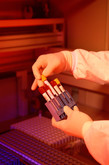Biosimilars
Modern monoclonal antibody production - focus on quality by design, timelines, cost
In the decade since severe capacity constraints limited monoclonal antibody (MAb) production, the industry has adjusted, so that today, overcapacity is the issue, along with developing techniques to ensure product quality, reduce development timelines, and decrease costs, writes Ms Gail Dutton in a Genetic Engineering & Biotechnology News Feature Article on 15 February 2010. Many of these issues will be explored at IBC’s conference on ‘Antibody Development and Production’ in March 2010 as she points out.
Will the EU biosimilars pathway be applicable to monoclonal antibodies?
To what extent is the existing framework for biosimilars in Europe likely to be applicable to monoclonal antibodies (mAbs)? This question was verified in a paper by Dr Christian Schneider –member of the EMA’s Committee for Medicinal products for Human Use (CHMP), Chairman of EMA’s Biological Medicines Working Party (BMWP) and the Paul-Ehrlich-Institut in Langen, Germany– and Dr Ulrich Kalinke of the Paul-Ehrlich-Institut and Twincore Center for Experimental and Clinical Infection Research in Hannover, Germany, as published in Nature Biotechnology of September 2008.
A follow-on biologic drug is not a ‘biogeneric’: Lessons from Omnitrope and Valtropin
In an article by Dr Robert Roth and Dr Nicholas Fleischer of the Weinberg Group published in Journal of Generic Medicines of May 2009, it is stated that a follow-on biologic drug is not a ‘biogeneric’, based on lessons from Sandoz’s biosimilar human growth hormone Omnitrope (somatropin) and BioPartners’ Valtropin (somatropin).
PhRMA, Amgen correct NEJM article on biologics exclusivity
In a NEJM Letter to the Editor of 18 February 2010, Mr David Wheadon, Senior Vice President of the Scientific & Regulatory Affairs team of the Pharmaceutical Research and Manufacturers of America (PhRMA) –having been employed by several pharmaceutical companies (Eli Lilly, GlaxoSmithKline, Abbott) and holding stock in Abbott Laboratories and GlaxoSmithKline– corrects the NEJM Perspective article by Mr Engelberg et al. of 12 November 2009, writing that “the record should be set straight” with regard to the market exclusivity of biologicals in the biosimilars debate.
FDA approves Amgen’s and Johnson & Johnson's the risk evaluation and mitigation strategy (REMS) for erythropoiesis-stimulating agents (ESAs)
Amgen and Johnson & Johnson (J&J) announced on 16 February 2010 that the US FDA approved the companies' risk management strategy for patients with chemotherapy-induced anaemia who are receiving erythropoiesis-stimulating agents (ESAs), including Amgen's Aranesp (darbepoetin alfa) and Epogen (epoetin alfa), and Johnson & Johnson's Procrit (epoetin alfa).
Improving effector functions of MAbs for cancer treatment: Enhancing antibody-dependent cell-mediated cytotoxicity (ADCC) and complement-dependent cytotoxicity (CDC)
Mr Akito Natsume et al. of Kyowa Hakko Kirin, Machida-shi, Tokyo, Japan, have shown to improve effector functions of monoclonal antibodies (MAbs) for cancer treatment by enhancing ADCC and CDC, as published in their review article in Drug Design, Development and Therapy 2009:3 of December 2008.
Aglycosylated IgG mAbs can be engineered to display unique FcγR selectivity that mediate antibody dependent cell-mediated cytotoxicity
Until recently, bacterially derived monoclonal antibodies (mAbs) were unable to recruit innate immune cells and were thus ineffective at raising an attack against tumour cells. However, Mr George Georgiou et al. of the University of Texas, Austin, found that engineered mutations in the Fc domain can improve innate immune cell recognition by mAbs manufactured in bacteria, as published in the Proceedings of the National Academy of Sciences.
The study stems from efforts to make therapeutically useful mAbs in bacteria. A key roadblock is that bacterially manufactured antibodies lack Fc region glycosylation. “Antibodies that are not glycosylated cannot be recognised by immune cells,” said Mr Georgiou. In the article it is described how aglycosylated IgG variants expressed in bacteria that selectively bind FcγRI potentiate tumour cell killing by monocyte-dendritic cells. The authors explain that the N-linked glycan of immunoglobulin G (IgG) is indispensable for the interaction of the Fc domain with Fcγ receptors on effector cells and the clearance of target cells via antibody dependent cell-mediated cytotoxicity (ADCC). E.coli-expressed, aglycosylated Fc domains bind effector FcγRs poorly and cannot elicit ADCC.
US FDA prepares for biosimilars in 2011 budget plan, despite stalled healthcare reform bill
Increasing inspections and creating a regulatory pathway for the approval of biosimilars are among the most important areas of the US FDA's fiscal 2011 budget request, US Department of Health and Human Services (HHS) Secretary Ms Kathleen Sebelius says. In testimony before the House Energy and Commerce Committee on 4 February 2010, Ms Sebelius focused on funds included in the budget request for the FDA's efforts to improve medical product safety, including increased inspections and investment in tools to enhance the safety of increasingly complex drugs and biologics.
Bionomics of biosimilars - Indian options for investors
As reported by Ms Nayantara Som in BioSpectrumIndia of 13 January 2010, biosimilars are said to be the next big cash cow for India. However, players have many knots to untangle before they can have a firm grip over the economics of the market.
Bionomics of biosimilars – EU and US markets not easy for India
As reported by Ms Nayantara Som in BioSpectrumIndia of 13 January 2010, biosimilars are said to be the next big cash cow for India. However, players have many knots to untangle before they can have a firm grip over the economics of the market, she warns.










